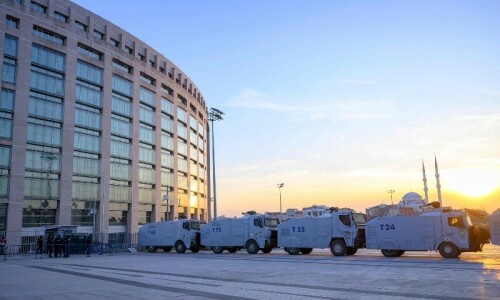ISLAMABAD: Senate Chairman Sadiq Sanjrani and National Assembly Speaker Asad Qaiser have decided to hold consultations with the opposition parties to resolve the controversy over the appointment of the members of the Election Commission of Pakistan (ECP).
The decision to engage the opposition was made by the custodians of the two houses of parliament after discussing the matter with the government’s legal team and constitutional experts during a meeting here on Tuesday.
In the meeting, Law Minister Barrister Farogh Naseem, Parliamentary Affairs Minister Azam Swati and Attorney General Anwar Mansoor Khan briefed the Senate chairman and the NA speaker on the legal and constitutional aspects of the issue in the light of the Oct 15 decision of the Islamabad High Court.
Sources said the participants were of the view that in order to resolve the matter once and for all, they might have to amend the Constitution or do legislation and for this purpose they would need the support of the opposition parties, especially in the Senate where the government was in a minority.
The Senate chairman and the NA speaker had discussed the issue on Monday also and they had decided to meet again on Tuesday in the presence of the law minister and the attorney general.
The meetings were held in the wake of the last month’s order of the IHC regarding the controversial and unilateral appointment of the ECP members from Sindh and Balochistan by President Dr Arif Alvi.
The law minister and the attorney general had been asked to suggest a way out to resolve the controversy that had been lingering on since the retirement of ECP members Abdul Ghaffar Soomro from Sindh and retired Justice Shakeel Baloch from Balochistan in January. Under the law, their replacements were to be appointed within 45 days.
Under the Constitution, a consultation between the prime minister and the leader of the opposition in the National Assembly is required for the appointment of the ECP members as well as the chief election commissioner (CEC).
After failure of Prime Minister Imran Khan and Leader of the Opposition Shahbaz Sharif to reach a consensus on the names, the matter was referred to a bi-partisan parliamentary committee, but it also failed to reach a consensus.
President Alvi, using his ‘discretionary power’, then appointed Khalid Mehmood Siddiqui from Sindh and Munir Ahmed Kakar from Balochistan on Aug 22 against two vacant positions from the respective provinces, prompting a strong protest by the opposition parties.
The controversy deepened when in an unprecedented move, CEC retired Justice Sardar Mohammad Raza refused to administer the oath to the two members, terming their appointments unconstitutional.
The president’s act was challenged before the IHC by Nisar Ahmed Cheema and Murtaza Javed Abbasi, the two opposition lawmakers from the Pakistan Muslim League-Nawaz (PML-N) and members of the parliamentary committee on appointments of the ECP members.
The IHC in its Oct 15 order, while referring the case to the parliament for deciding the controversy, had in a subtle way reminded the government that a presidential order could not overrule constitutional provisions while violation of the Constitution was tantamount to treason.
The petitioners had alleged that the president had bypassed the constitutional provisions.
The petitioners said there was no constitutional provision that allowed the president to appoint Mr Siddiqui and Mr Kakar by invoking his discretionary powers. They added that after the passage of the 18th Constitution Amendment, the president had lost his discretion to appoint the ECP members.
The IHC had directed the secretaries of the National Assembly and Senate to place copies of this order before the NA speaker and Senate chairman so that both could jointly endeavour to resolve the issue regarding ECP members’ appointment between the treasury and opposition benches.
The court also sought a report from both the secretaries by the next date of hearing and adjourned the matter till Nov 4.
Published in Dawn, October 30th, 2019
















































